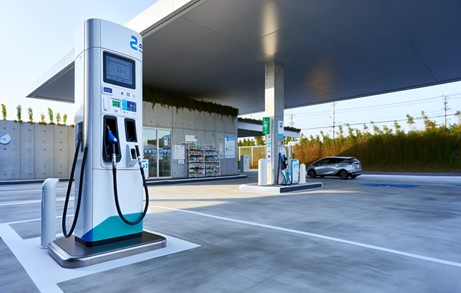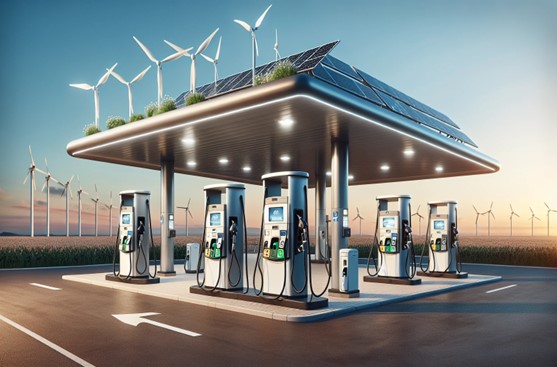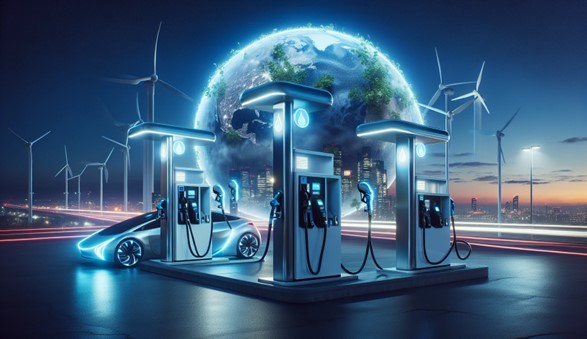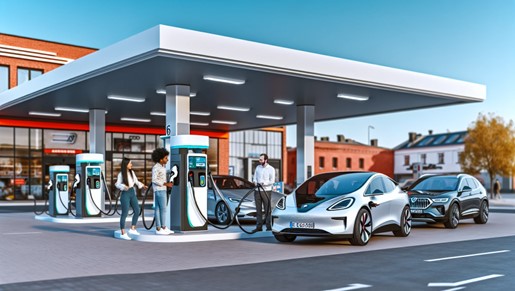Nick Kambitsis of Raceway Petroleum is an entrepreneur and independent gas station owner. In the following article, Nick Kambitsis explains that gas stations, as long-standing pillars of our transportation infrastructure, are at the forefront of embracing next-generation fuels and cutting-edge developments in fuel technology, offering gas station owners invaluable insights into what lies ahead and how they can adapt to usher in a new era of sustainable, efficient, and forward-thinking fuel solutions.
As the world transitions towards a more sustainable future, the fuel industry is undergoing a revolutionary transformation. Next-generation fuels are at the forefront of this shift, promising cleaner, more efficient energy sources. In this evolution phase, gas stations find themselves at the center of the change, facing both opportunities and challenges in adapting to new energy sources.
Below, Nick Kambitsis of Raceway Petroleum explores the emergence of next-gen fuels, how transportation service businesses can adapt to these changes, and the trends shaping the future of the fuel industry.
Nick Kambitsis of Raceway Petroleum Explains More on Next-Generation Fuels
The term “next-generation fuels” refers to a class of innovative and sustainable energy sources that aim to replace or complement traditional fossil fuels. These include biofuels, which are derived from organic materials like plants and waste, hydrogen fuel, known for its zero-emission properties, and electric charging stations, catering to the rising demand for electric vehicles.
Embracing environmentally friendly practices, next-gen fuels contribute to reduced carbon emissions and a more sustainable future for energy. Gas stations and energy providers are increasingly exploring and investing in these alternatives to meet the growing global demand for cleaner, more efficient fuel options.
The Emergence of Next Generation Fuels

The global energy landscape is undergoing a transformative shift with the emergence of next-generation fuels. This revolutionary change is characterized by a focus on sustainability and environmental responsibility. Within this landscape, three prominent categories are shaping the future of fuel: Biofuels, Hydrogen fuel, and Electric charging stations.
• Biofuels
Nick Kambitsis of Raceway Petroleum explains that biofuels represent a significant breakthrough in sustainable energy solutions. Derived from organic materials such as plants, agricultural crops, or even waste, biofuels offer an eco-friendly alternative to traditional gasoline. By 2040, global usage of biofuels is projected to reach 223 million tons of oil equivalent (Mtoe). This increase in demand signals the significance that these renewable energy sources hold as an option for lowering carbon emissions while maintaining cost-effectiveness and requiring minimal infrastructure investment.
It’s essential for gas stations to prepare themselves by offering blends that contain biodiesel or ethanol with regular gasoline or diesel fuel.
• Hydrogen Fuel
Hydrogen fuel is also gaining prominence as a clean and efficient energy source. When used in fuel cells, hydrogen generates electricity with water as its only byproduct, making it a zero-emission product. Nick Kambitsis of Raceway Petroleum says that the versatility of hydrogen makes it suitable for countless applications, from powering vehicles to supporting industrial processes, signaling an especially promising future for this innovative fuel.
• Electric Charging Stations
With the rise of electric vehicles, electric charging stations have become a crucial aspect of the next-generation fuel landscape. These stations provide a convenient and sustainable solution for powering EVs, contributing to the reduction of air pollution and dependence on traditional fossil fuels. The widespread deployment of electric charging infrastructure is vital for supporting the growing number of electric vehicles on the road.
Nick Kambitsis of Raceway Petroleum notes, in fact, there are already over 138,100 outlets across the US dedicated solely to plug-in EVs. This number is projected to exponentially rise up to 35 million by 2030. It’s also expected that 26 million electric cars will be found on American roads by that point.
Adapting Gas Stations to New Fuel Technologies
 As next-generation fuels become integral to the energy landscape, gas stations must adapt to stay relevant. This involves a multifaceted approach encompassing infrastructure upgrades, technological integration, diversified services, and strategic partnerships.
As next-generation fuels become integral to the energy landscape, gas stations must adapt to stay relevant. This involves a multifaceted approach encompassing infrastructure upgrades, technological integration, diversified services, and strategic partnerships.
Investing in Infrastructure Upgrades
What’s particularly crucial to this adaptation is investing in infrastructure upgrades. This includes installing hydrogen dispensers, electric charging stations, and storage facilities for biofuels. Upgrading existing facilities ensures that gas stations remain relevant in the evolving energy landscape.
Digital Transformation
Nick Kambitsis of Raceway Petroleum explains that data plays an integral role in assisting fuel station owners to attract and keep customers. Fuel stations can employ data analytics technology to gain knowledge of what their customers desire so that they can customize experiences, run effective marketing campaigns, and ensure that their gas pumps remain well-maintained at all convenience stores associated with the business.
To stay ahead in a competitive market space, it is essential for these businesses to embrace digital transformation such as contactless app-based fueling and payment solutions, which allows them to adapt based on customer needs while still providing an excellent service experience.
By taking advantage of both data analysis techniques along modern digital technologies, they can make sure that consumers’ expectations are being met more effectively than ever before when it comes to gasoline services from any given outlet!
Creating a Multi-Fuel Service Station
Diversification is key to meeting the varied needs of consumers. Gas stations should aim to evolve into multi-fuel service stations, which offer a spectrum of fuel options from traditional gasoline to biofuels, hydrogen, and electric charging. Nick Kambitsis of Raceway Petroleum says that this approach will position gas stations as comprehensive energy hubs that cater to a broad clientele.
Adaptation to Autonomous Vehicles
The advent of autonomous vehicles requires gas stations to adapt. Integrating autonomous vehicle charging and refueling capabilities ensures that these vehicles can seamlessly access the energy they need, aligning gas stations with the entire future of transportation.
Marketing To and Educating Consumers
Effective communication is crucial in encouraging consumers to adopt next-generation fuels. Gas stations should implement marketing campaigns that highlight the environmental benefits, cost savings, and convenience of these new fuel options. Additionally, educating consumers about the technology and infrastructure behind these fuels fosters understanding and acceptance.
Collaborating with Renewable Energy Providers
Nick Kambitsis of Raceway Petroleum says that establishing partnerships with renewable energy providers is a strategic move for gas stations. Working together ensures a consistent and reliable supply of biofuels, hydrogen, and electricity. This partnership also reinforces a commitment to sustainability and strengthens the gas station’s position in the evolving energy landscape.
Future Trends
 The future of fuel technology holds exciting prospects as innovations continue to shape the industry, such as:
The future of fuel technology holds exciting prospects as innovations continue to shape the industry, such as:
Emerging Innovations
With the growing popularity of hybrid and electric vehicles due to incentives like subsidies, tax reliefs, and stricter pollution controls, fuel stations need to be ready for a massive shift in their services. It’s estimated that by 2050, 97% of cars on our roads will be powered by electricity. As such, they won’t require oil changes or related maintenance that is necessary for gas-based engines. The rising demand for next-gen fuels also means adapting infrastructures with installations at these refueling points, such as charging spots and hydrogen dispensers.
Potential Impact on the Industry
Nick Kambitsis of Raceway Petroleum reports that gas stations are facing significant changes in the fuel industry, with electric vehicles and other new technologies emerging. Biofuels have great potential to reduce dependence on fossil fuel imports, lower environmental damage, and decrease carbon emissions, all of which can revolutionize this space.
By 2030, it is estimated that there will be 26 million electric cars operating around the US, meaning gas companies must adjust their services to cater to these customers’ charging needs as well. To ensure they stay successful within their ever-evolving environment, gas station owners should pay attention not only to both innovative advances and any corresponding laws so that they comply fully at all times.
Summary
The era of next-generation fuels is upon us, presenting both challenges and opportunities for gas stations. By understanding and embracing biofuels, hydrogen fuel, and electric charging stations, gas stations can position themselves as leaders in the evolving energy landscape. Investing in infrastructure upgrades, embracing digital transformation, creating multi-fuel service stations, and adapting to autonomous vehicles are essential steps in this process.
Overcoming challenges such as changing consumer preferences, infrastructure requirements, and regulatory compliance is critical for long-term success. As the fuel industry continues to evolve, staying informed about emerging innovations and trends will be key to thriving in a sustainable future.








